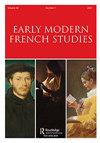记忆之声:17世纪蒙彼利埃法国宗教战争的声音冲突与遗产
IF 0.2
3区 历史学
Q2 HISTORY
引用次数: 2
摘要
本文探讨了声音在现代蒙彼利埃早期的纪念意义,重点是使用游行音乐和教堂钟声来纪念法国宗教战争。学术研究表明,宗教改革后的欧洲的音乐往往有助于巩固忏悔身份,但本文认为,在蒙彼利埃等宗教混合的社区,声音也起到了记忆载体的作用。在法国宗教战争之后,新教徒和天主教徒开发了相互竞争的音景,唤起了人们对战争的痛苦记忆,并在整个17世纪持续了宗教紧张局势。天主教徒依靠频繁的游行来回忆他们的教堂和修道院在新教徒手中被摧毁的情景,并选择特定的歌曲来强调他们在重建天主教崇拜方面的胜利。失去教堂钟声的记忆也促使他们在战后与新教安装自己的钟声的尝试作斗争。在未发掘的档案资料的基础上,本文还对17世纪蒙彼利埃天主教徒的音乐文化进行了重建,特别关注了大教堂和白人忏悔者的聚会*本文章由计算机程序翻译,如有差异,请以英文原文为准。
The Sound of Memory: Acoustic Conflict and the Legacy of the French Wars of Religion in Seventeenth-Century Montpellier
This article explores the commemorative meaning of sound in early modern Montpellier, focusing on the use of processional music and church bells to remember the French Wars of Religion. Scholarship has demonstrated that music in post-Reformation Europe often served to consolidate confessional identities, but this article argues that in religiously mixed communities like Montpellier, sound also served as a memory vector. In the wake of the French religious wars, Protestants and Catholics developed competing soundscapes that revived painful memories about the wars and sustained religious tension throughout the seventeenth century. Catholics relied on frequent processions to recall the destruction of their churches and monasteries at the hands of the Protestants, and chose specific songs to underline their triumph in re-establishing Catholic worship. The memory of losing their church bells also prompted them to fight Protestant attempts at installing their own bells after the wars. On the basis of untapped archival sources, this article also reconstructs the musical culture of Catholics in seventeenth-century Montpellier, paying particular attention to the cathedral chapel and the confraternity of White Penitents.*
求助全文
通过发布文献求助,成功后即可免费获取论文全文。
去求助
来源期刊

Early Modern French Studies
Multiple-
CiteScore
0.10
自引率
0.00%
发文量
14
期刊介绍:
Early Modern French Studies (formerly Seventeenth-Century French Studies) publishes high-quality, peer-reviewed, original articles in English and French on a broad range of literary, cultural, methodological, and theoretical topics relating to the study of early modern France. The journal has expanded its historical scope and now covers work on the sixteenth, seventeenth, and eighteenth centuries. Within this period of French literary and cultural history, the journal particularly welcomes work that relates to the term ''early modern'', as well as work that interrogates it. It continues to publish special issues devoted to particular topics (such as the highly successful 2014 special issue on the cultural history of fans) as well as individual submissions.
 求助内容:
求助内容: 应助结果提醒方式:
应助结果提醒方式:


